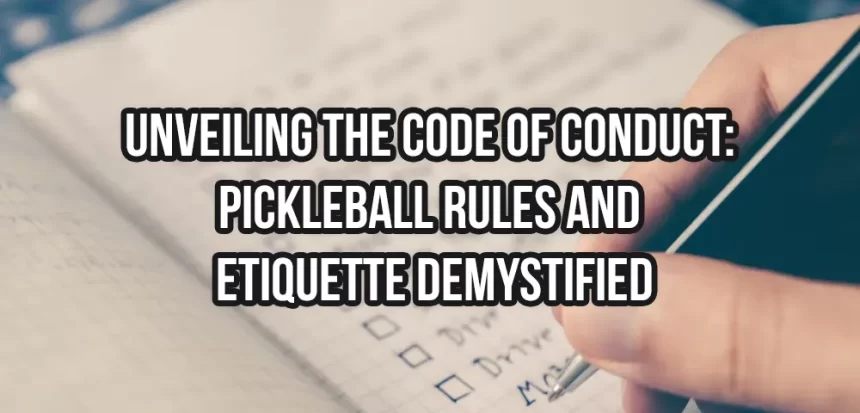Unveiling the Code of Conduct: Pickleball Rules and Etiquette Demystified
Pickleball is not just a game; it’s a community-driven sport that thrives on camaraderie, fair play, and mutual respect. Understanding the rules and etiquette of pickleball is essential for fostering a positive playing environment and enjoying the game to its fullest. In this article, we will provide a comprehensive guide to pickleball rules and etiquette, ensuring that you have the knowledge and confidence to navigate the court with grace and sportsmanship.
Section 1: The Fundamental Rules of Pickleball Heading: A breakdown of the essential rules in pickleball
Serving:
- The server must stand behind the baseline and serve diagonally to the opponent’s service court.
- The ball must be served underhand and below the waist.
- The serve must clear the non-volley zone (kitchen) and land within the opposite diagonal court.
Double Bounce Rule:
- After the serve, each team must allow the ball to bounce once before volleys are permitted.
- This rule ensures that both teams have an equal opportunity to return the ball from a groundstroke.
Non-Volley Zone (Kitchen):
- The non-volley zone is a designated area on the court, spanning 7 feet from the net on both sides.
- Players cannot volley (hit the ball in the air) while standing within the kitchen.
- Exceptions to this rule include groundstrokes and balls that land in the kitchen.
Scoring:
- Points are scored only by the serving team.
- Games are typically played to 11 points, and a team must win by at least two points.
- The serving team switches sides after each point is scored.
Section 2: Maintaining Proper Etiquette on the Court Heading: Guiding principles of pickleball etiquette
Sportsmanship and Respect:
- Treat your opponents, partners, and officials with respect and courtesy.
- Congratulate opponents on good shots and demonstrate good sportsmanship regardless of the outcome.
Line Calls:
- Make honest and fair line calls, erring on the side of giving the benefit of the doubt to your opponents.
- If you’re unsure about a line call, offer the point to your opponents and replay the shot.
Waiting for the Server:
- Give the server ample time to prepare and get ready before returning their serve.
- Be attentive and ready to receive the serve promptly to maintain the flow of the game.
Communication and Court Awareness:
- Communicate clearly with your partner to avoid collisions and maximize teamwork.
- Be aware of your surroundings, including your position on the court, your partner’s movements, and the location of other players.
Section 3: Advanced Etiquette and Strategies Heading: Going beyond the basics for an elevated pickleball experience
Warm-Up and Practice:
- Arrive early for your game to warm up properly and practice your shots.
- Utilize designated warm-up time to familiarize yourself with the court conditions and adjust your gameplay accordingly.
Spectator Etiquette:
- Respect the boundaries of the court and avoid distracting players during matches.
- Keep noise levels to a minimum and refrain from unnecessary movement around the court.
Adapting to Skill Levels:
- Be mindful of the skill levels of your opponents and adjust your play accordingly.
- Encourage and support less experienced players, fostering an inclusive and welcoming environment.
Court Cleanup:
- Dispose of any trash, water bottles, or debris in designated areas to maintain a clean playing environment.
- Leave the court in good condition for the next players.
Section 4: Tournaments and Competitive Play Heading: Special considerations for pickleball tournaments and competitive matches
Following Tournament Regulations:
- Familiarize yourself with specific tournament rules and regulations.
- Adhere to time limits, equipment regulations, and any additional guidelines set by the tournament organizers.
Umpire and Referee Decisions:
- Respect the decisions made by umpires and referees, even if you disagree.
- Avoid arguing or challenging their calls, as this disrupts the flow of the game and can lead to unnecessary tension.
By following the rules and embodying proper etiquette, you contribute to the vibrant and inclusive pickleball community. Whether you’re a novice player or a seasoned competitor, adhering to these principles ensures a positive experience for everyone involved. Embrace the spirit of sportsmanship, respect your opponents, and enjoy the thrill of pickleball to its fullest.


Leave a Reply